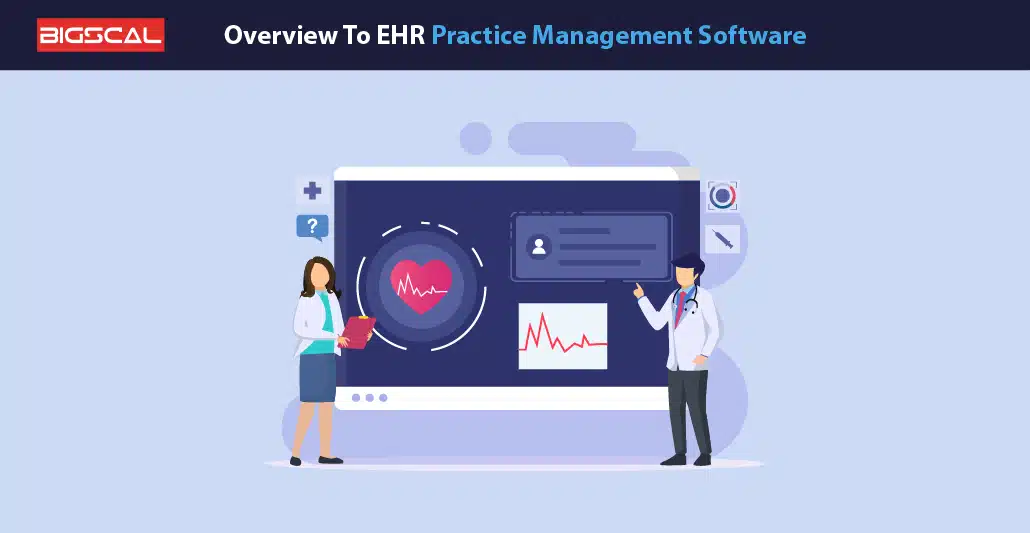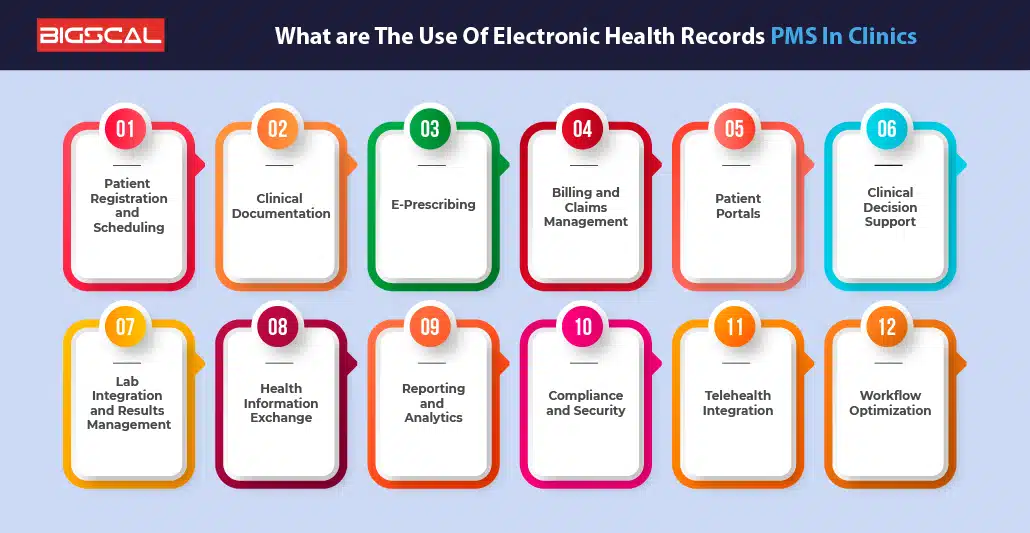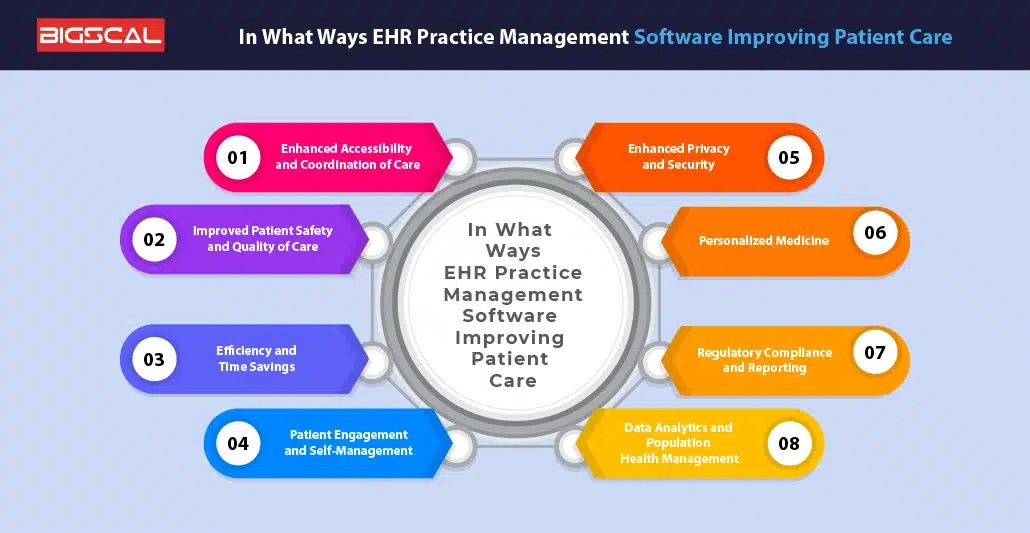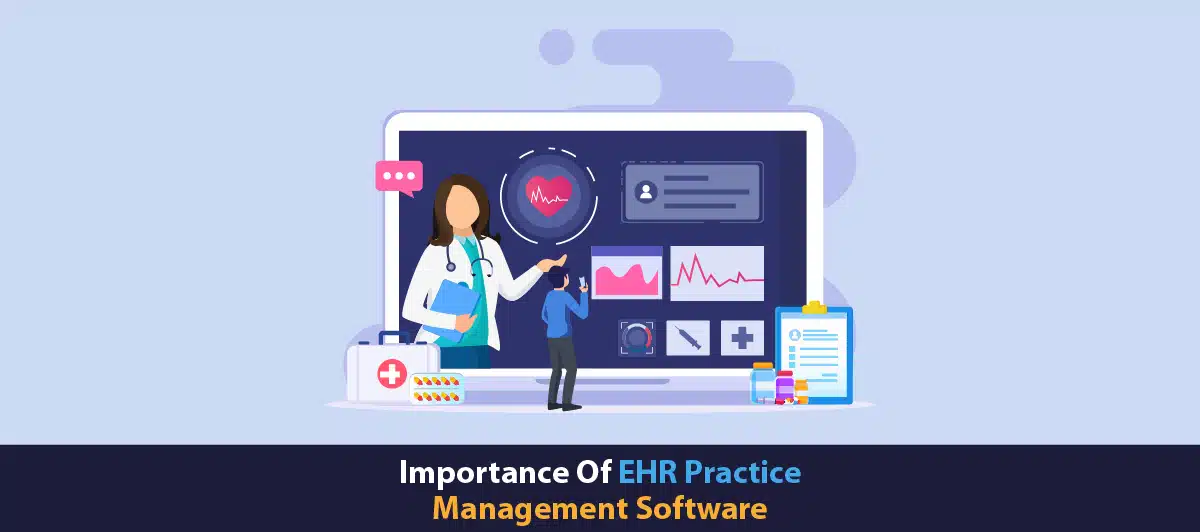How EHR Practice Management Software Improving Patient Care
Quick Summary: EHR practice management software is improving patient care in various ways. If you want to know how exactly it does so then you have to read this blog as we will discuss how it helps healthcare organizations to streamline workflow by implementing medical practice management software. So, keep reading!
Introduction
Due to a rapidly evolving health care environment, electronic health record practice management software is becoming an important tool for managing medical practices. Additionally, this combination of immersive technology and mandated healthcare tools is minimizing the complexity of overall healthcare practice. The EHR systems substituting paper records improve the availability and portability of patient data for healthcare organization. This results in better diagnosis, treatment options, and consequently, enhanced healthcare results for the patients.
Further, EHR practice management aids in decreasing the workload in mundane activities. Such activities may include scheduling and booking of appointments, billing, and the management of the patient’s information. This enable healthcare professional to spend more time with their patients rather than online forms.
The integration of practice management systems with EHRs are the boon for healthcare providers. These tools promote better interaction among the health care teams while at the same time providing accurate information about the patient. Besides, they help to improve the quality of healthcare practices.
That’s not end here. There are more advantages of the EHR practice management system. Keep reading and know how this integration makes it a best Best EHR Software!
Overview To EHR Practice Management Software

Hospitals use Electronic Health Records or EHR practice management systems to organize patients’ records and automating administrative tasks. It combines two key functions: health information management technology such as electronic health records and general administrative processes of a medical practice.
EHR, This segment of the software maintains digital patient records repositories on patients’ medical histories, health conditions, diagnosis, treatment, medications among other parameters. It facilitates quick record retrieval and input of new data. Therefore, it helps in improving the quality of records or information.
Practice management system, assists in the management of a medical practice, which may include both internal and external management. They encompass appointment setting and keeping, invoicing, and insurance claims, and communication with patient. It facilitates these tasks and minimizes paperwork and administrative costs.
Thus, by having EHR and practice management as one system, healthcare providers could work more efficiently, provide better care to patients, and make processes better.
What are The Use Of Electronic Health Records Practice Mgmt Software In Clinics
Here the ways EHR PRMS works and how its features benefits the healthcare practice:

Patient Registration and Scheduling Appointments
The main function of this software is to make patient registrations and appointments convenient in clinics. Initially, whenever a patient comes to a clinic for the first time, the details of the patient including the name, contact information and other details are recorded in the system EHR Scheduling Software. This process is fast and relatively free from mistakes as we can compare to paper filled forms.
The software also helps to coordinate appointments as it enables the staff to set appointments, reschedule or cancel them. Patients can even fix appointments online, get notifications through email or mobile app.
Clinical Documentation
This combination of EHR and practice management software also work to systemize the documents. When a patient comes to the clinic, then the healthcare provider can input information to describe the patient’s case, plans and progress notations in a clinic. The use of this form of documentation is advantageous. It easier to read compared to notes written by hand thereby diminishing the chances of misunderstanding.
This also facilitates easy retrieval of the history of those patients for subsequent visits hence enhances continuity of care. Further, it implies keeping of records which are always important for legal and billing processes.
E-Prescribing
E-prescribing is one of the components of EHR systems whereby the prescribers can prescribe and send prescriptions electronically to the pharmacies. This reduces the instances of handwritten prescriptions. It also increases efficiency, since the prescription arrives at the pharmacy in a few minutes, which saves patients’ time. Additionally, it allows E-prescribing systems to self check for drug interactions and allergies, leading to better medication safety. It also assists in keeping track of all prescribed medication records to support the continued patient care in the future.
Billing and Claims Management
EHR and practice management software make billing and claims management more efficient in clinics. Preparation of bills is also done by this system since it eliminates human error in the creation of bills based on service delivery. This also assists in submitting insurance claims electronically and makes reimbursement more efficient. The software can check insurance details, monitor the status of the claim, and handle all the denied claims to ensure that the clinic gets paid in a proper manner. Such automating tasks minimizes figures handled by the staff while ensuring that the clinic has sound financial status.
Patient Portals
Patient portals are secure web applications with interfaces that are connected to the client’s EHR systems, which offer patients access to their records. The patient is able to interact with the healthcare provider from the comfort of their home or workplace. And they can perform tasks such as checking and monitoring of test results, appointment schedules, prescription refills among others. It allows patients to take personal control over their health and thus be proactive in the process of their care.
This also reduces the time taken to make phone calls, or visits to the clinic to obtain simple information that may be found on the website. Patient portals contribute significantly to the improvement of the patient experience since they make healthcare more transparent and accessible.
Clinical Decision Support
Clinical Decision Support (CDS) systems into EHR deliver hundred percent evidence based suggestions to the clinicians. These tools help in compiling and interpreting patient information with notifications, suggestions, and best practice recommendations to inform clinical judgments. For instance, CDS can inform providers about possible drug interactions, possible diagnosis, or appropriate treatment options as informed by present studies.
This also aids in decision making, minimizing mistakes, and hence, enhancing patient care. Thus, through the inclusion of the best practices in the routine clinical processes. CDS tools improve care quality and guarantee the delivery of the optimal treatments.
Lab Integration and Results Management
EHR software interacts with laboratory information systems to facilitate the process of requesting analyses and receiving reports. Every time a doctor prescribes a lab test, the request is made electronically to the laboratory and the results are returned back to EHR. This saves time, minimizes the chances of producing erroneous results, and guarantees that the healthcare provider has timely and relevant information.
Health Information Exchange
HIE enables the exchange of patients’ information within various related healthcare facilities using an EHR system. This exchange helps in keeping a patient’s records, care plans and any other relevant information available to practitioners. It also helps to avoid duplication of tests and procedures to enhance the quality of services patients get from the hospitals.
Reporting and Analytics
The EHR and practice management software also function as the providers reporting and analytics. These tools can also produce patient demographic information, treatment plans, and financial status. In this way, analyzing this data enables clinics to uncover trends, control performance with benchmarking, and respond to them effectively in a clinic.
For instance, analytics may reveal that a clinic has a high prevalence of a specific disease and apply prevention or intervention initiatives. Thus, it also helps clinics to become more efficient with their resources and provide better care for patients while being compliant with all necessary laws and regulations.
Compliance and Security
EHR software meets the requirements of healthcare legislation and protects patients’ data. Security components which include access controls, encryption technologies, and audit trails. Legal requirements like the HIPAA standards should be adhered to in order to retain patients and not risk penalties. In this way, clinics can ensure patient privacy and regulatory compliance that is necessary for their functioning.
Telehealth Integration
Remote consultation and healthcare services can be provided through telehealth integrated EHR software in clinics. With this feature, patients can easily make appointments with their healthcare provider through video calls, phone calls or through a secure messaging platform.
Hence, improving access to care without having to show up physically at the clinic. Telemedicine also increases the availability and delivery of care to patients in rural settings or those who have difficulty moving and improves patient follow-up.
Workflow Optimization
EHR practice management software assists within clinic functioning by eliminating bottlenecks in administrative and clinical management. This involves appointment setting, patient registration, payment options, and record keeping. For example, an appointment reminder system cuts down the cases of no-show while electronic documentation shortens the charting time.
This eliminates tedious work and makes the flow of information easier and this means that clinics work more efficiently. And physicians and other health care providers spend more time taking care of patients. Efficient processes result into reduced waiting time, effective use of resources
In What Ways EHR Practice Management Software Improving Patient Care
The Practice management software along with EHR improves healthcare in many ways. We are disclosing every way here:

Enhanced Accessibility and Coordination of Care
EHR (Electronic Health Record) Practice Management Software smooths the way for physicians and healthcare teams to access patients’ records easily and effectively. Having all your necessary data, including medical history, results of tests, and treatment plans, saved in a single, protected database accessible remotely.
This means that the doctors who attend to you when you visit your general practitioner. When you consult a specialist, or when you are in an emergency are in a better position to take informed decisions regarding your treatment. Also, this software will enable inter-professional collaboration and coordination among the healthcare team. Your primary care doctor can simply forward important data to the specialists.
They can easily share information and discuss the specific details of your care. It makes sure that patients get the best quality treatment in the context of coordinated care and no repetition of tests. As such, for those with chronic illnesses or post-surgical patients, care is coordinated throughout the variation improving general health and wellness.
Efficiency and Time Savings
Electronic Health Record (EHR) Practice Management Software enables doctors and nurses to do more in less time. It is much easier if they could just type or click to enter your health information instead of writing on paper. It centralizes all your medical information and lays them out in an orderly way. In a way that the providers will not search for information for long. This is much time saving because they do not have to search for papers or try to understand written documents that are barely legible.
Also, EHR systems can help you to be notified about something. For example, when you are supposed to come for a check-up or when it is time to take a new prescription. The rest of the time can be used well by doctors for better attention to you, as well as giving better care.
Patient Engagement and Self-Management
EHR Practice Management Software also assists patients with becoming more engaged in the management of their own care. Suppose you visit an online site and there you find all your records displayed on the screen. This way you can not only check your test results, set up an appointment, or send a message with your concern to your doctor.
People have health information at their fingertips in the comfort of their homes through the online platform. This eliminates some of the barriers that hinder you from monitoring your health status and interacting with your medical practitioners. Further, some EHR systems provide functionalities that allow you to monitor items such as blood pressure or diet. That is why when patients are more involved in the process.
Improved Patient Safety and Quality of Care
One of the most important benefit of EHR Practice Management Software is to contribute to improved patient safety and their healthcare outcomes. Since records are digital, the data breaching is not possible and there is no worry about misplaced documents. They can then, with a detail, document your medical history, medications, and allergies. Therefore, it minimizes cases of adverse drug effects or wrong treatment plans.
In addition, such systems contain coded signs that alert the doctors as well as provide reminders regarding the current policies and methodologies. For instance, they can get a message that a patient could have a drug allergy or is due for screening based on the patient’s age and record. It assists in gauging that effective and suitable attention is given because of this. It enhances consequences, and decreases medical errors.
Enhanced Privacy and Security
The use of EHR practice management software leads to more effective and efficient care delivery through its benefits of privacy and security. This system enable easy storage and management of sensitive medical data. In a way that patient data is safe from exposure or breaches.
The use of strong encryption and access controls also makes EHR software secure against cyber threats as well as any unwanted disclosure of patient information. Further, it is common for these systems to contain records of user activity in the context of a patient’s record. It helps healthcare organizations to quickly identify potentially problematic actions by employees.
In addition, EHR software assists the healthcare organization in following the standards like HIPAA for the privacy and security of the data. It also provides confidence to the patients since they know their personal health information is well protected and legally requite.
Personalized Medicine
EHR solutions involve practice management and support patient-centered approach for a more effective treatment of patients. It provides long-term storage for records of patients that contain their medical history, test results and treatment details. With this information easily accessible, doctors can then create treatments that are most effective for the particular client.
For example, if a particular patient has certain genetic markers, allergies or other specific conditions, the software alerts about them. So, only the appropriate medications or therapies for that patient are administered. This approach means early identification of health problems and increase effectiveness and safety when prescribing medicines or other treatments.
Regulatory Compliance and Reporting
EHR software also helps to keep records of various legal and reporting necessities that various healthcare service providers are required to adhere to. It helps in handling many organizational tasks like recording patient interactions. Like processing of claims with insurance service providers.
In this aspect, the automation of these processes will enable the healthcare providers to spend much of their time on delivering quality services to the patients. Furthermore, the software prepares reports that are needed by the international organizations. This is to make sure that these facilities are same as standards set as far as quality and safety. This contributes to saving time and money. Also, it assess which practices of patient care needs to be improved.
Data Analytics and Population Health Management
Using an electronic system to keep track of health information and make this information available to your healthcare provider. EHR software gathers and stores such information. It can be helpful for a physician to monitor your condition in the course of time. From this information, health care professionals are able to easily search for trends, patterns and risks which may be of significance to the population’s health. Data analysis also benefits doctors as it enables them to make the right decisions about patients treatment in order to accord the appropriate attention that you need.
EHR software allows the provider to look at the data collected from millions of patients to evaluate health and risk patterns. For example, if a community is showing a high prevalence of asthma, then the healthcare organization can call for programs or changes in air quality. Thus, the EHR software effectively addresses health issues on the population level. It enhances the general well-being of the population as per the reduction of rates of diseases. It also creates opportunities for individuals to be more healthy and prevent them from getting sick.
Build EHR Practice Management With Bigscal Technologies
if you also need a EHR with Practice Management software then you can contact us because:
At Bigscal Technologies we focus on creating unique Electronic Health Records (EHR) Practice Management systems. The purpose of our products is helping your practice to work more efficiently. Thereby we enable us to spend less time on paperwork and more time on patients.
All our clients use our EHR Practice Management system since it is easy to use and effective. It compiles all the aspects of the practice management into one platform. Our system includes features such as scheduling, billing, patient records, and reporting, which makes everything convenient. Additionally, Our EHR solution is safe to deploy since patient content will always have to meet federal healthcare industry guidelines.
Moreover, Our team will be glad to provide any help, answer your questions, or help to resolve any difficulties that may appear during the process of developing and integration.
Conclusion
Therefore, EHR practice management software is revolutionizing the healthcare system in that it helps increase patient outcomes. As this advances, the healthcare practices will be very useful since it will make sure that they are delivering the best solutions in a growing technological environment. It helps healthcare organizations in various ways to improve patient care. And you have understand all that ways by reading above points.
FAQ
Can EHR systems help doctors with revenue cycle management?
Yes, EHR systems can assist physicians in managing revenues by facilitating, standardizing, minimizing errors, and optimizing documentation in billing. This brings about fast approval of claims, effective collection of payments, and consequently improved financial position of the medical practices.
Why is better patient communication important for hospitals?
Therefore, improved patient communication is important in a hospital setup since it promotes patient satisfaction. It also provides compliance to prescription and reduces incidences of misunderstanding. Effective communication increases patient compliance, promotes compliance, and may help avoid future hospitalizations.
What software is most frequently used by medical practices?
Medical practices are found to use Electronic Health Records (EHR) software most commonly. It aids in tracking patients’ records, optimizing clinical processes, and ensuring documentation consistency, thus enhancing productivity and treatment delivery.
Which software can help in handling healthcare financial transactions?
Application software for the practice can manage the healthcare financial transactions involved. It involves such functions as billing, coding, claims processing, and payment collections that allow for proper financial operations and relieve healthcare providers of additional administrative work.
Explain healthcare Practice management.
Healthcare practice management encompasses organizational management and coordination of day-to-day medical practices. It involves the appointment calendar, accounts receivables, patients, and any other money related transactions.







